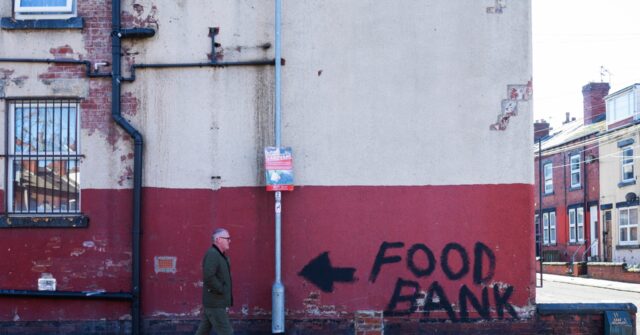Top News
Cost of Living Crisis: One in Seven Faced Going Hungry in Britain Following Lockdowns

One in seven adults faced food insecurity in the United Kingdom in the year leading up to the middle of 2022, research from the Trussell Trust has found this week.
A survey conducted by the Ipsos polling firm alongside the Trussell Trust, which operates a network of food banks across the UK, has found that 14 per cent of all UK adults faced the threat of going hungry in the 12 months to mid-2022.
The research found that having a paid worker in the household was not determinative in whether people were forced into using food banks to stay afloat, with one in five people who used a Trussel food bank coming from a working household.
The chief executive at the Trussell Trust said: “Being forced to turn to a food bank to feed your family is a horrifying reality for too many people in the UK, but as Hunger in the UK shows, this is just the tip of the iceberg.
“Millions more people are struggling with hunger. This is not right. Food banks are not the answer when people are going without the essentials in one of the richest economies in the world. We need a social security system which provides protection and the dignity for people to cover their own essentials, such as food and bills.”
The period studied by the Trust came around the time that coronavirus lockdown restrictions were finally being lifted, however, this was also the time at which inflation began to set in.
People Need to ‘Accept’ Being Poorer Amid Inflation, Says Central Banker https://t.co/bCKs4a4Thv
— Breitbart London (@BreitbartLondon) April 27, 2023
Last week, Agustin Carstens, the head of the Swiss-based Bank of International Settlements, a financial institution often dubbed the central bank of central banks, admitted that the inflationary crisis and the ensuing cost-of-living crisis was a result of government and central bank policies during the lockdowns, namely the spending spree to pay workers to remain home and business shut and the money printing by central banks to pay for the state spending.
“While understandable as the Covid crisis broke out, with the benefit of hindsight, it is now clear that the fiscal and monetary policy support was too large, too broad-based and too long-lasting,” the central banker said.
The economic calamity has only continued in Britain, despite promises from former Goldman Sachs banker turned Prime Minister Rishi Sunak, who was installed last Autumn in Downing Street — against the wishes of Conservative Party voters — on the back of a promise to reign in inflation and debt reduction.
Much like his promises to reduce illegal immigration, Sunak’s government has so far proved incapable or unwilling to take the steps to curb the cost of living crisis, with inflation remaining at 8.7 per cent, over four times the Bank of England’s target rate of 2 per cent. Meanwhile, despite taxes being at a 70-year-high, debt has actually risen to £2,567.2 billion, or in other terms 100.1 per cent of GDP.
Despite the growing evidence of economic hardship and negative societal impacts of lockdowns, the former Health Secretary of Britain, Matt Hancock, who was in charge of the nation’s lockdown before being fired for breaking his own rules, argued this week that lockdown restrictions should have been “more stringent“.
‘Global Policy Failure’: Lockdowns Had ‘Negligible’ Impact on Deaths Compared to ‘Staggering Collateral Costs’, Study Finds https://t.co/HZqlpsZLlk
— Breitbart London (@BreitbartLondon) June 8, 2023
Follow Kurt Zindulka on Twitter: Follow @KurtZindulka or e-mail to: kzindulka@breitbart.com
Read the full article here


















